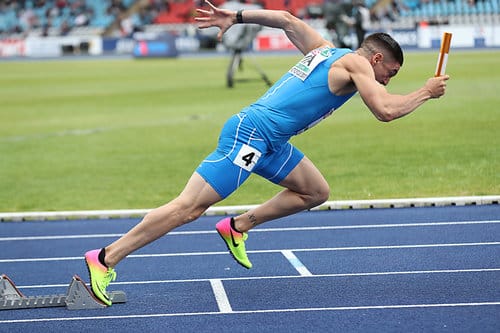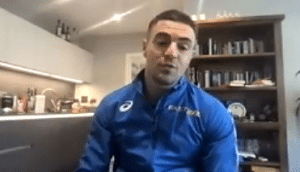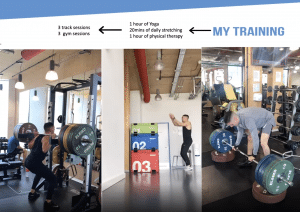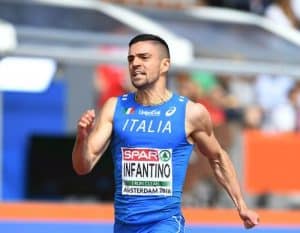To be the best: learning from an élite athlete

A world-class sprinter who has automatically qualified for the Tokyo Olympics explained to QE’s young sportsmen the long road he has to follow in order to achieve those explosive seconds of success in a few short metres on the track.
 In a special virtual lecture, Antonio Infantino covered areas such as nutrition and sleep, outlined what he does in training, and spoke about the importance of the right mental approach.
In a special virtual lecture, Antonio Infantino covered areas such as nutrition and sleep, outlined what he does in training, and spoke about the importance of the right mental approach.
Director of Sport Jonathan Hart said: “My thanks go to Antonio for a talk that gave a detailed picture of all the ingredients that lie behind élite-level sports success. It was great to hear his own story and I am grateful that he gave such thoughtful answers to the boys’ questions.”
QE’s now well-established lecture programme gives pupils of all ages the opportunity to learn from and question prominent individuals in their respective fields. It continued online through both lockdowns as part of the School’s work to ensure that boys did not miss out during the period of remote education.
Antonio, who will be 30 later this month, is a top 200m sprinter with a personal best of 20.41 seconds. Born to Italian parents but raised in Hertfordshire, he is based in London.
He is the three times British Indoor 200m Champion and has competed at European and World championships. He decided to switch nationality in his early 20s to follow his Italian heritage and represent Italy.
“If the Games go ahead, I hope to be in Tokyo later this year,” he said. His 2021 goals are to make the Olympic final in the 4x100m – he has already automatically qualified for the Games in this event – and the 200m. Following this, Antonio is hoping to ‘medal’ at the Mediterranean Games and European Championships 2022, before looking ahead to his second Olympic Games in Paris.
 Antonio delivered his lecture in two lunchtime sessions. Both were open to all boys. “It all started for me when I was in secondary school,” he said. Inspired by Usain Bolt’s remarkable victory in the Beijing Olympics 100m in 2008, Antonio achieved a remarkable 100m time of 11.3s while in Year 8. At the age of 14, he achieved 10.9s, which, he said, was one of the fastest times of all time for that age group.
Antonio delivered his lecture in two lunchtime sessions. Both were open to all boys. “It all started for me when I was in secondary school,” he said. Inspired by Usain Bolt’s remarkable victory in the Beijing Olympics 100m in 2008, Antonio achieved a remarkable 100m time of 11.3s while in Year 8. At the age of 14, he achieved 10.9s, which, he said, was one of the fastest times of all time for that age group.
In his 20-minute talk, he spoke to the boys about nutrition, about diet and about the “often overlooked” importance of sleep, before giving them a taste of what he does in training. He then spent more than 10 minutes answering their questions.
Antonio paid tribute to the support of his parents, with his mother cooking healthy food and his father taxiing him around the country to various athletics events when he was younger.
In fact, when he went to university, the lack of such support – he had to cook for himself – coupled with some partying, led to a dip in his performances. “Through those bad years when I was not running well, I learned once again to be patient.”
In 2018, after a series of disappointments he nearly quit, but decided to carry on and has since achieved new levels of success. “That taught me that…you are going to fail [and] if you fail, you are going to learn. I have lost more races than I have won, but I think I have learned more from my failures than from the races I have won. So, keep patient and keep persevering and you can still achieve what you want to achieve.”
 During the Q&A session, Antonio discussed the issue of ‘nature vs nurture’. Evidence suggested that through long hours of practice and expert training alone, anyone could reach élite levels in certain fields of endeavour. He pointed to the example of László Polgár, Hungarian chess teacher and educational psychologist, who trained his three daughters to play chess almost from the cradle. They went on to tremendous success, with one, Judit, widely considered to be the best female chess player ever.
During the Q&A session, Antonio discussed the issue of ‘nature vs nurture’. Evidence suggested that through long hours of practice and expert training alone, anyone could reach élite levels in certain fields of endeavour. He pointed to the example of László Polgár, Hungarian chess teacher and educational psychologist, who trained his three daughters to play chess almost from the cradle. They went on to tremendous success, with one, Judit, widely considered to be the best female chess player ever.
Yet Antonio said it was not true that anyone could reach the very top in athletics, since in sport, genetics were also important: “You do need to pick your parents carefully if you want to be a top sprinter!”
Nevertheless, for aspiring athletes to achieve success, mindset is very important, he said. “Really believe you can do something,” he advised the boys. “Mindset is hugely important in my sport. I had a lot of naysayers…self-belief is really important.”
Asked about how he is paid, he spoke of his financial dependence on sponsorship and said that he must wear sports clothing made by his sponsor, rather than by other manufacturers.
He had some specific advice when asked about his approach to a race by one of the School’s sprinters, saying that he maps out in his mind how the race will go. He advised sprinters to try to ‘explode’ out of the blocks and then to take long strides in the early stages of the race, rather than going at a fast cadence, in order to conserve energy.
He urged a “multisports” approach for the boys. “I think that everyone should try a bunch of sports, and that’s the best way to find one you are good at.” Antonio himself had played a number of sports during his school years, reaching academy level with Watford FC. He dropped this involvement in order to focus on athletics, but still enjoys playing various sports informally, stating that the general fitness they develop in some ways makes his specialised athletics training easier.
